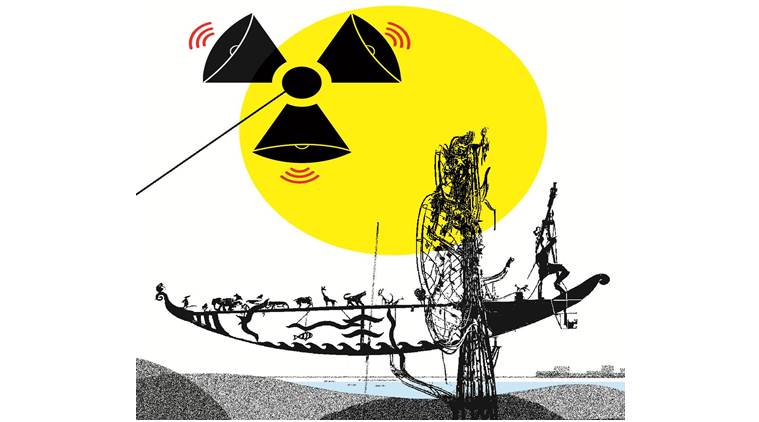
Let’s not go deep into the past. Just a few decades ago, a young Pardhan man of twenty-two arrived in Bhopal from a small village of Patangarh in Mandala district. He belonged to a community of musicians, but his music and that of his community had gradually been fading in the absence of social patronage. But in his body, or perhaps in some remote corner of his memory, forgotten notes of his ancestral home still trickled through and sought a space to manifest themselves in a new form.
Those were the days when the renowned painter and thinker Jagdish Swaminathan had been attempting to create an open museum of Indian arts in Bharat Bhavan. He had realised that Adivasi and folk art, like urban modern art, was an integral component of contemporary art. It became the first such museum of the world that placed all forms of arts on an equal pedestal.
Swaminathan brought folk and Adivasi arts from across Madhya Pradesh to Bhopal. The Pardhan man, Jangarh Singh Shyam, crossed Swaminathan’s path, and soon he was in Bhopal. In Bharat Bhavan he found the much-needed space to transform the music echoing within him into a unique form of painting. This was 1982. The global recognition of Jangarh’s form and style has progressively increased since then.
The city of Bhopal witnessed a remarkable transformation as it opened new vistas for Gond-Pardhan Adivasis. They found new meaning of their life and modes of livelihood. Bhil painters soon followed the Gonds and found the city facilitating them to realise their artistic yearnings.
It could be made possible in Bhopal because it is a city of madhya laya (Middle Tempo). It moves neither too fast, nor too slow. There are fewer cities in India that have a large number of elderly people stand near a lake watching the changing hues of the setting sun on the water surface. A city that sees people assembled in circles till late night surrounding others who play chess on squares carved on stone-slabs, and discuss a plethora of issues, ranging from the moves of the wily knight to world politics. A city that still devotes two pages in newspapers on events of poetry-recital and music performances.
Two Czech filmmakers and scholars were in Bhopal a few weeks before. They were researching the cinema of Mani Kaul. As they met local residents, they couldn’t believe that even ordinary citizens have such refined tastes. Citizens who always spare time to help passer-byes.
One acknowledges that nature has generously bestowed itself on this city. It has wonderful hills, its soil enables mighty trees to spread their roots. But it is also true that in the last thousands of years its residents have enhanced the gifts of nature by their art and modes of living.
The lake of Bhopal was once among the biggest manmade lakes of the world. Thousands of trees were planted in the new city around forty years before. The residents have zealously guarded them since then. They often break into protest against any plan to cut the trees. The city has at least three art institutions of global repute: Bharat Bhavan, National Museum of Man and Madhya Pradesh Tribal Museum.
The city has perhaps never seen communal riots being planned during elections. Candidates who were sent by the people to the state assembly or Lok Sabha never destroyed the quiet temperament of the city in order to secure their victory. Fourteen years before, I vividly recall, a woman chief minister had cut a cake in a temple on the occasion of Hanuman Jayanti. The chief minister, one of Bhopal’s resident writers had commented, didn’t even know the customs of Hanuman Jayanti. The writer was hurt by the chief minister’s ignorance who called herself a Sadhvi.
This is the first instance that a candidate has been parachuted to the city who not only does not belong to the city, but will also make all the attempts to poison the air. This is the first instance when an election will be used not only to destroy the city, but also to vitiate the atmosphere of the entire country. It is perhaps immaterial that this candidate will eventually be defeated, what concerns me is that her presence will create such an atmosphere in Bhopal that will further intensify the violence and cacophony elsewhere in the country during the ongoing elections. Bhopal has always been known as the city of writers, painters and musicians. The cynical electoral ploy has threatened the city’s reputation.
The writer, an acclaimed Hindi poet and short story writer, is a resident of Bhopal. Translated by Ashutosh Bhardwaj